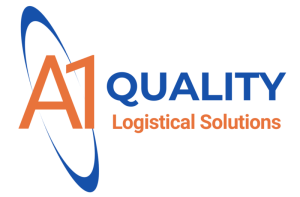A1 Quality Logistical Solutions
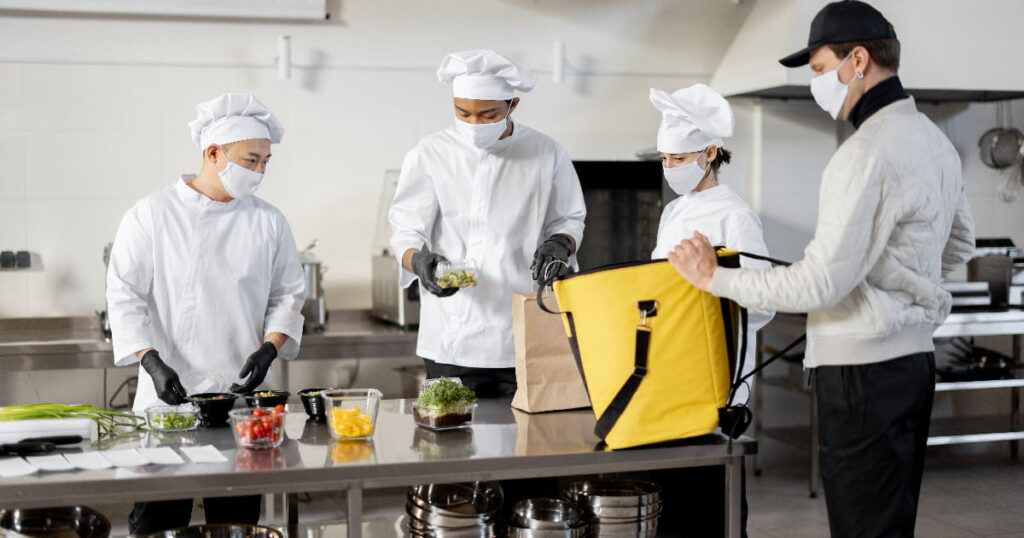
- By Haley
- August 5, 2025
Table of Contents
Key Highlights
- Sanitation services play a vital role in enhancing food safety, ensuring regulatory compliance, and building customer satisfaction in supply chain operations.
- Proper sanitation practices minimise risks associated with bacteria, pests, and chemical contamination for smooth logistics operations.
- These services ensure effective inventory management, support order fulfillment, and optimise warehouse functions.
- Outsourcing sanitation boosts operational efficiency, reduces shipping costs, and offers advanced logistics solutions to businesses.
- Innovative cleaning techniques, such as automation and sustainable methods, are modernising sanitation processes in the supply chain.
- Implementing robust sanitation strategies improves customer experience while protecting the business’s bottom line.
Introduction
Good cleaning services are very important in places where you handle or store food. They help keep warehouse management strong, make supply chain work smoother, and make sure food meets the main rules the government sets. By stopping problems before they start and keeping things clean, sanitation helps keep customers happy and makes everything run better. These practices help protect inventory levels, make logistics services better, and keep things in line with the law. All of this is needed to build a safe and trusted food storage space. Now, let’s see why these safety steps are so important in warehouse management, and look at the basics of keeping warehouses focused on safety.
The Importance of Sanitation in Food Handling and Storage Facilities
Good sanitation practices are key for keeping supply chain management strong. They help lower the risk of contamination, protect inventory, and keep customer orders running smoothly. In storage spaces and handling areas, good sanitation is a must for food safety in all supply chain operations. This helps keep the trust and happiness of people who buy from you.
Also, when you follow hygiene rules and cleaning steps, your business can help warehouse management and logistics operations go well. This goes from making sure storage areas are right to having a clean spot for order fulfillment. Keeping your facility in good shape makes your business more efficient and helps people feel good about what you do for them.

Understanding Food Safety Regulations in the United States
The United States has strong rules for food safety. These rules help protect people’s health and keep warehouse management working well. When warehouses follow these rules, supply chain operations run smoothly. The rules talk about how clean storage spaces must be and how to get orders ready for delivery.
The FDA Food Code gives the main rules warehouses must follow. This includes how to keep things clean, employee hygiene, and how to care for equipment. Warehouses must meet these standards because customer satisfaction is important. If a warehouse does not follow the rules, it can face delays, get fines, and lose trust from people who need their distribution services. The right food handling in all of supply chain operations depends on these rules.
The FSMA (Food Safety Modernization Act) creates even more steps for warehouse management. It tells warehouses to check for risks of contamination and to make plans that stop problems before they start. Facilities that store food need to make sure their warehouse management system matches the law. They have to keep records to prove they follow the rules. Certification is important. It shows both customers and regulators that the business takes care of the supply chain in the right way.
Key Risks Associated with Poor Sanitation
Unsanitary food handling in logistics operations can create big risks for inventory management and customer satisfaction. Some common problems are:
- Bacterial contamination: The germs that can harm people grow in places that are not clean. This puts order fulfillment at risk.
- Pest infestations: If a place is not cared for in the right way, pests can get in. They can ruin goods in storage. This will lead to trouble for the supply chain and can cost companies money.
- Chemical residue: If cleaning is not safe, there can be chemicals left on food. This can make food unsafe to eat.
- Operational inefficiencies: When these risks pile up, order fulfillment gets held up, fewer customer orders get filled, and shipping costs can go up.
All of these problems can hurt how well the whole supply chain works. Using good cleaning habits and checking for cleanliness on a regular basis will help keep logistics services running without stopping. It also helps protect the food storage areas and means better results in inventory management and for customer satisfaction.
Impact on Public Health and Consumer Confidence
Not paying attention to sanitation in supply chain management can harm public health. It can also hurt trust from customers. If there are pests or germs in places where food is stored, products can get dirty or spoiled. This can lead to big safety problems. Not keeping things clean can also affect how happy people feel about the business. It can put both customer satisfaction and the names of business owners at risk.
When customers know the company takes care with food handling and keeps things clean, they feel better about the company and how it manages its supply chain operations. Also, following good standards keeps things running smoothly in warehouse management. It helps prevent problems and protects the business’s bottom line.
For business owners, having clean facilities helps them succeed over time. Good sanitation makes the customer experience better and grows trust in the supply chain. It also helps avoid money losses and problems with the law that can come from health issues. If a company wants its supply chain and distribution services to work well, it must stay clean. This is also true for logistics companies that want smooth day-to-day work. Cleanliness is important every step of the way in supply chain management functions.
Common Contaminants in Food Facilities
Food handling areas in warehouses often have problems with contamination. This can lower inventory levels and affect logistics services. Bacteria, pests, and leftover chemicals can mess up how things work. These things cause delays, cost more money, and make customer satisfaction drop.
It is important to handle these risks in supply chain operations to keep customer relationships strong and to make logistics services work well. When companies use strong cleaning steps for each type of inventory, they can protect their bottom line. They also make spaces safer for everyone to handle food. Soon, we will talk more about the main threats to food safety in these places.

Bacteria and Pathogens: Major Threats
Unclean warehouse spaces can help bacteria grow. This puts the supply chain and order fulfillment at risk. If the area is not clean, harmful bugs like E. coli, salmonella, and listeria can get into food stocks. This hurts food inventory quality in the warehouse management process.
Every food-handling facility must clean all surfaces and equipment well. This should be done often during warehouse management. It is good to use proper cleaning tools and have high-frequency cleaning routines. Checking for germs often can also lower the chance of bacterial problems. Employees need to do their part, too. When everyone works on keeping the area clean, the space is safer for food storage.
Having better ways to control risk, like checking temperature and watching for germs, can help keep people’s trust. Proper cleaning can boost customer satisfaction as well. It helps keep inventory safe. This also makes sales channels and logistics run smoothly for the long term in the supply chain.
Pests and Infestation Risks
Food storage spaces can have pests because of where the warehouse sits, changes with the seasons, or poor ways of managing the space. If you do not handle these pests, they eat the goods, make the area dirty, and slow down how a fulfillment center works.
Training warehouse workers on how to handle pests, along with the use of warehouse management software, helps get rid of many risks from pests. And if you seal up any way for bugs or rats to get in, do fumigation, or put in traps, you can keep warehouse items safe across all distribution services.
It is also good to check what is going on in the warehouse and use green methods for handling pests. If you do this, you make pest problems better for the long term. When a business can show it offers logistics services without pests, customer experience gets better too. The right way to stop these risks leads to a well-run and efficient operation.
Chemical Contaminants and Residue Issues
Chemical build-up from using the wrong cleaning methods can be a big risk for food storage places. If order processing or fulfillment centers are not kept clean, bad things can get into stored products.
It is good to choose safe cleaning supplies and steps to cut down on the chances of chemical contamination. Warehouses need to wash all equipment and surfaces well and follow rules when using cleaning products. Doing these steps each day will take away any bad chemicals from the tools and surfaces.
Following all these cleaning rules protects the business from getting in trouble and keeps customers happy. Lowering risks while handling shipping costs helps your financial success and can boost operational efficiency. If you follow proper rules, customers will have a good experience at all warehouse locations. This will also make your food handling safe for a long time, especially during order processing.
Core Components of Effective Sanitation Services
Good sanitation services need to be steady, exact, and use a good fulfillment strategy. Logistics providers have to keep facilities clean, take care of waste the right way, train the workers well, and use eco-friendly choices.
When businesses team up with skilled service providers, they get access to new technologies, clear processes, and all needed compliance papers. Working on tailored solutions with logistics experts helps with warehouse management and makes the customer experience better. Sanitation plays a key part, from guarding inventory to making supply chains smoother. It is a factor in every area of a food facility’s success.
Let’s look closer at cleaning and sanitizing and how they matter to what we do.
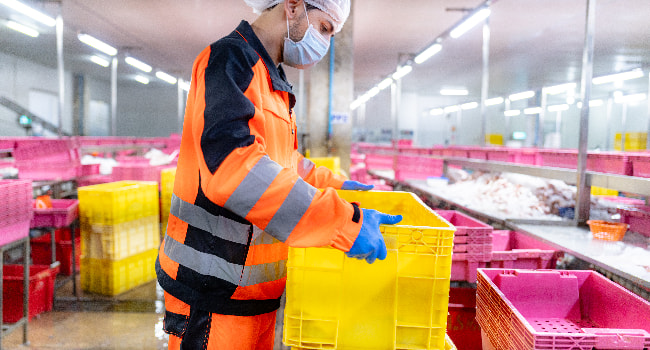
Cleaning vs. Sanitizing: What’s the Difference?
In your own warehouse, it is important to know the difference between cleaning and sanitising. This helps you get the most out of key performance indicators in ecommerce fulfillment. Cleaning takes away dirt and dust you can see, both from spaces and the things you use. Sanitising works on germs that you cannot see, meeting the standards that are set by rules and groups in the field.
When you clean, you go after the dirt that is easy to spot. But when you sanitise, you work on stopping those tiny threats you might miss. This makes the space safer to get things ready for shipping. Warehouse managers need to set up the right routines. You should balance your tasks to make sure every spot and tool stays clean and safe for people and items.
By using both cleaning and sanitising in the right way, you keep the goods safe and raise the level of customer satisfaction in your supply chain. If you follow the right steps and rules, things go better in your business. This helps logistics providers match their work with what others see as the best ways to do it. This will also help you grow stronger in supply chain operations and make your own warehouse shine when it comes to service.
Recommended Cleaning Procedures and Frequency
Having a clear cleaning plan is key for keeping food places clean and safe. Every day, you should wipe and clean surfaces and tools that people touch a lot. This will help stop germs from spreading. Once a week, make sure to clean hard-to-reach spots. These can be places where you store things or behind big equipment. Every month, look over your cleaning plan and check that it matches what you need for your business and follows the rules. Changing how often you clean to fit your supply chain operations and customer needs can help keep up high standards for hygiene. Using a good warehouse management system to keep track of your cleaning plan will help you work better and follow health rules. This can really boost your operational efficiency in the supply chain.
Choosing the Right Sanitation Equipment and Supplies
Choosing the right sanitation equipment and supplies is important for food safety in storage areas. It helps you stay in line with rules and keeps everything safe. If you invest in high-quality products, you lower the risk of germs and help with your inventory management. You need to have some key supplies like sanitizers, disinfectants, and surface cleaning tools made for different surfaces. Using automated cleaning systems can also make your work easier and increase operational efficiency. These systems help save on labor costs and make the sanitation process better. You should check how well your equipment is working by looking at your key performance indicators. This way, your sanitation plan can follow the best in the industry. It helps with customer satisfaction and keeps your storage facility within health regulations.
Regulatory Requirements for Sanitation in the U.S.
Regulatory standards for sanitation in the U.S. are important for food safety and good quality. The FDA Food Code lists what food businesses must do for safe food handling, how they should store food, and what cleaning steps to take. To follow the Food Safety Modernization Act, or FSMA, these places need to stop contamination before it happens. This keeps people safe. Third-party audits look at how well these rules are being followed. These checks help people see if a business runs the way it should. By knowing what rules they must meet, places can make their cleaning better. This lets them keep a high level in supply chain management. It also helps with customer satisfaction. So, strong rules help protect everyone in the supply chain and keep customers happy.
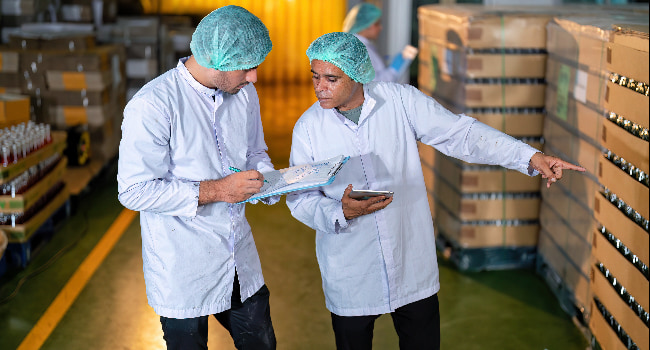
FDA Food Code Compliance Essentials
Making sure that food handling and storage places follow the FDA Food Code is very important. The food code is a set of rules. It tells you what you need to do to lower the risk of food getting dirty or unsafe. You need to keep foods at the right temperature, clean all surfaces well, and make sure every worker knows what to do and how to do it. Doing these things not only keeps people safe, but also helps make the supply chain faster and smoother. If you look at what you do every so often and change your ways when the rules change, you follow the law better. This also helps keep customers happy and lets your place stand out in the busy market.
FSMA (Food Safety Modernization Act) and Its Implications
The Food Safety Modernization Act (FSMA) changes how people think about food safety. It asks food businesses to act before problems start, not after. Food facilities now must set up strong controls that look for risks and stop them early. Cleaning rules have to be followed all the way through the entire supply chain.
Following FSMA helps keep people safe, but it does more than that. It also makes work smoother and helps build trust with customers. When a company knows the FSMA rules, it becomes less likely to face fines for not following them. This law can help a business do better with logistics operations and inventory management. By following FSMA, companies can make their supply chain work well from start to finish.
Third-Party Audits and Certification Standards
Third-party audits are key in making sure places that handle and store food follow good sanitation rules. These checks are done by outside groups. They look at if the rules, often based on the FDA food code, are being followed. This helps make work smoother and faster. Getting certified shows that a business does things right. It also builds trust with customers, showing a strong focus on quality and safety.
When businesses use these audits, they can find things that might not be working well in the way they clean. This helps them keep getting better all the time and manage any risks that come up. Working with trusted partners to do these checks makes logistics operations better and smoother. This helps everyone in the entire supply chain and leads to greater customer satisfaction.
The Role of Sanitation in Preventing Cross-Contamination
It is very important to keep things clean when you handle and store food. Good cleaning habits help stop germs from moving between items or surfaces. This is a big part of food safety. Warehouse management teams need to know about key places where problems can start. They should make sure all workers get why washing hands and cleaning workspaces matter so much. Using new warehouse management systems can help watch over these cleaning steps. This will help things run better and make customers more happy during the whole supply chain. Doing regular training and following all steps will help stop cross-contamination in food facilities even more.
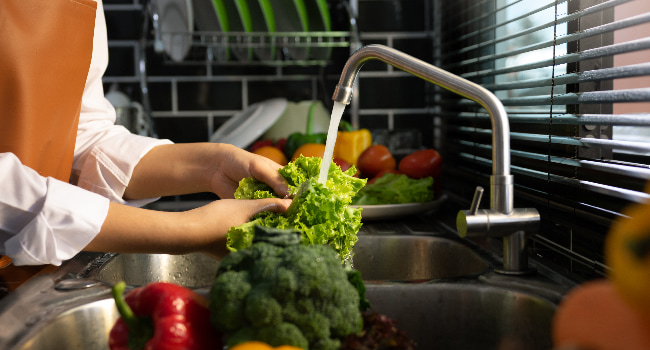
Critical Control Points in Food Facilities
Identifying critical control points (CCPs) is important to keep food safe in any facility. These are spots that need close checking. At these points, hazards can happen that could affect the quality of the products. Good sanitation steps at CCPs help stop problems during storage and handling. It is important that warehouse workers get regular training on these things. This helps everyone follow the right rules and meet industry standards. Using warehouse management software makes it easier to keep track of cleaning and record it well. Doing this helps supply chain operations run better. It also brings greater customer satisfaction because products stay safe and high in quality. Great warehouse management is key to customer satisfaction and a smooth supply chain.
Employee Hygiene and Training Best Practices
Keeping high standards for employee hygiene is very important in food handling and storage places. There should be regular training to show the right ways to wash hands. It’s also important to talk about personal safety gear and how to manage food safely. Adding practice with role-playing and using real-life examples can help people understand and remember better. A good onboarding process will help new team members know why hygiene matters in the bigger picture of logistics operations. This also shows how much hygiene can matter to customer satisfaction. Training needs to be updated often so everyone knows the latest best ways to do things. This helps make sure the staff follow all health and cleanliness rules.
Equipment and Surface Sanitation Protocols
Putting good sanitation rules in place for equipment and surfaces is very important for food safety and quality. Cleaning must happen often and should match how much you use the equipment and how likely it is to get dirty. Clean equipment that people touch a lot every day. Items that are not used as much can be cleaned once a week.
Make sure you use the right cleaning products that are safe for food contact. This helps get the job done better. It is also important to follow the correct steps, like washing off all cleaner and letting things dry well. Doing all this helps you meet industry rules and lowers the risk of spreading germs.
Designing a Sanitation Program for Food Facilities
To make a good sanitation program, you need a clear plan that fits your food handling needs. Start by looking for any risks in your building. You should find the most important points where you must keep things clean. Write out the steps, the things you need, and the gear for every area. Make a schedule so cleaning happens often. Keep good records because they help your team stay on track. Check how everything is going and use those checks to make things better over time for greater customer satisfaction. Working with skilled service providers helps you manage your systems better and often leads to more operational efficiency and greater customer satisfaction.
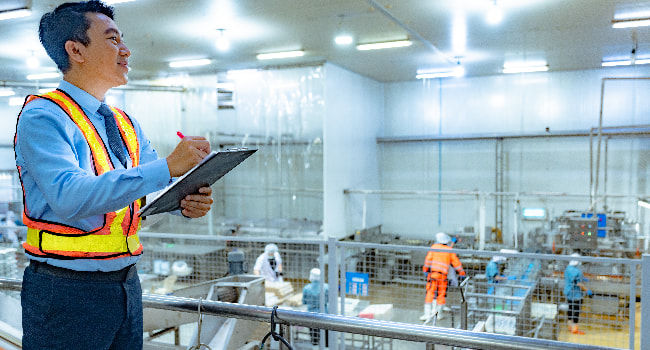
Steps to Develop a Customized Sanitation Plan
Making a clear sanitation plan starts when you look at the way things are done right now and how your place is set up. You need to know the important spots where germs might get in. Be sure to list both the equipment and surfaces. The rules for each should be easy to understand.
After that, set steps for cleaning. Say how often the cleaning should happen, and give more attention to spots people touch a lot. Train your workers, so they know what good hygiene looks like. This helps make sure everyone acts as they should.
Keep a regular check on cleaning and write down what is done. This helps keep up good work and lets you change things when you need to. In the end, use what the experts know in the industry to keep making your sanitation plan better and stronger.
Scheduling and Documentation Best Practices
Efficient sanitation scheduling is important. It helps you keep up with food safety rules and improves the way you work in a food facility. Having a regular routine for cleaning is key. When you do this, you should also keep good records. This makes sure all cleaning happens at the right time and is easy to check if needed.
Warehouse management software lets you better track all cleaning tasks and schedules. This helps you see if cleaning is done right and makes your inventory management better.
If you check your records often, you can spot patterns in how cleaning gets done. This helps keep everyone safe and leads to greater customer satisfaction. In the long run, regular checks help you follow the rules, keep risks low, avoid cross-contamination, and stop foodborne illnesses. Good warehouse management, strong routines, and careful tracking make your operations smooth and bring greater customer satisfaction.
Monitoring, Verification, and Continual Improvement
Setting up a way to watch and check what happens at food handling and storage places is very important. This helps keep high standards for clean work. Regular checks show what needs to get better, so the work meets the rules of this industry. It also makes work move better. If you use key performance indicators (KPIs), you can track how well the cleaning works get done. It will also show if workers follow the right steps.
If people always try to do things better, this will help make inventory management easier to handle. It will make logistics operations run smoother as well. All of this will lead to greater customer satisfaction. When people are happy, the bottom line for the business in the supply chain will be better, too.
Addressing Challenges Unique to Storage Facilities
Storage facilities face their own kind of problems that need special ways to handle them. It is important to keep the right temperature and humidity in the area. If these change a lot, products can get damaged. The staff needs to use a strong inventory management system. This lets them keep the right stock levels and cut down on waste.
It is also key to stop pests. People who run these spaces need to always watch for things like bugs or rodents. They also need to act fast if they find any signs of pests. Another thing is, there is a difference between working with goods that go bad fast and those that last longer. Workers need clear plans and rules for both types so they keep everything safe to use. This also helps them to follow the laws.
When all of these things are handled the right way, storage spaces can boost their operational efficiency. They can improve customer satisfaction and make the whole supply chain work better.

Temperature and Humidity Control
Keeping the right temperature and humidity in storage spaces is important for good food quality. It helps businesses meet rules as well. With strong controls over the environment, companies can cut down on spoilage and slow down the growth of harmful germs. This is key for effective inventory management. Good temperature monitoring systems give real-time data. This means you can make changes fast, which will help increase operational efficiency.
It is also a good idea to put temperature-sensitive items in smart spots throughout the storage space. This simple step can lower the risk of spoilage even more. When businesses manage humidity well, they can provide greater customer satisfaction. This leads to better customer satisfaction, more loyal shoppers, and protects the bottom line as markets change.
Pest Prevention and Management
Stopping and controlling pests is very important in food handling and storage. You need to keep this area clean to make sure food stays safe. Using an integrated pest management (IPM) plan helps stop pests and fits well with best practices for supply chain management. Regularly check for pests, seal any entry points, and get rid of waste the right way. These steps make it much less likely that pests will show up.
When companies use industry expertise, they can find the best ways to handle pests. This keeps the place safe and up to standard. It also helps boost customer satisfaction and improves how the whole fulfillment process works. Doing this keeps supply chain operations running smoothly and helps everyone have a good work experience.
Handling Perishable vs. Non-Perishable Goods
Handling both perishable and non-perishable goods in a storage building needs different plans. Perishable items must stay at the right temperature and humidity. This keeps quality high, cuts down on spoilage, and helps meet safety rules. For non-perishable goods, it is key to use good inventory management. This boosts shelf life and helps reduce waste. Using warehouse management can also speed up order processing. This works for both types of goods. It leads to better customer experience, as orders are filled quickly.
When you keep stock levels steady and follow correct sanitation rules, operations run well. This way, businesses can do their work in a better way, get more profit, and give good service to customers.
Benefits of Outsourcing Sanitation Services
Outsourcing sanitation services can help a business get more done. It lets companies use the skills of people who know the job well. Having access to this industry knowledge means the business can follow the rules and lower the risk around food safety. If you work with a skilled service provider, your company can keep the sanitation process simple, which can save money on labor and equipment. This choice is good for improving how clean the facility is. It also helps you keep up with the best ways of doing things. When you do this, your business can focus on supply chain operations and keep customers happy with strong food handling standards. This can boost operational efficiency and customer satisfaction, letting you spend your time on what matters most.
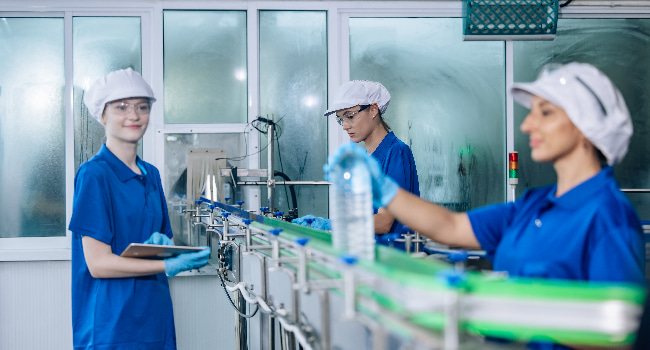
Access to Industry Expertise and Advanced Technology
Working with outsourced logistics providers gives you access to experts in the field and new technology. This is very important for good sanitation in places where people handle and store food. These service providers use the latest ways to clean and the right supplies for each job. This helps you meet changing sanitation rules. They also bring in smart systems to keep things clean. These systems help you work better and give you real-time updates.
Using these services helps with inventory management and cuts down on problems like cross-contamination. When you use this approach, both the supply chain and operational efficiency get better. In the end, it leads to greater customer satisfaction throughout the entire supply chain.
Cost Savings and Efficiency Gains
Outsourcing sanitation services helps the business save money, especially on labor costs. It also means there is no need to spend a lot on in-house training for workers. When a company works with experts who use new cleaning technology, it can make the work run better and faster. It can also make cleaning tasks easier and help control inventory levels so the company does not have too much or too little stock. If you pick a logistics provider that focuses on sanitation, you can improve the entire supply chain too. This can lower shipping costs and increase customer satisfaction by making sure things run well at different locations. Using this method helps you meet compliance rules and have better performance across the business. In the end, it is a good way to keep supply chain operations strong and make most people happy with the work done.
Consistent Compliance and Risk Reduction
Putting strong focus on doing things right when it comes to sanitation rules can lower risks in food handling and storage buildings. This same way of doing things matches with supply chain rules and helps everything run more smoothly. When workers use proper monitoring and keep good records, the business can use warehouse management systems to make sure each step of the cleaning process is checked. Following these rules keeps people safe while bringing greater customer satisfaction. It also helps with inventory management and improves how orders get filled. By working to lower risks, companies keep their bottom line stronger in a market where the supply chain can be tough.
Innovations and Trends in Sanitation Services
Emerging technologies are changing the way people handle cleaning services in food handling and storage places. Automation, like robotic cleaning systems, helps businesses clean better and faster. It also makes sure cleaning gets done without stopping normal work. Smart sanitation systems use sensors to check how clean a place is in real-time. This helps companies meet rules set by the government.
Eco-friendly cleaning solutions are becoming more popular too. These fit well with the goal of being better for the environment and cutting down harm. All these new ways help in increasing both operational efficiency and customer satisfaction. People can trust a place more when they see it clean, which is good for food safety practices. Using these trends helps make sanitation programs work better overall.
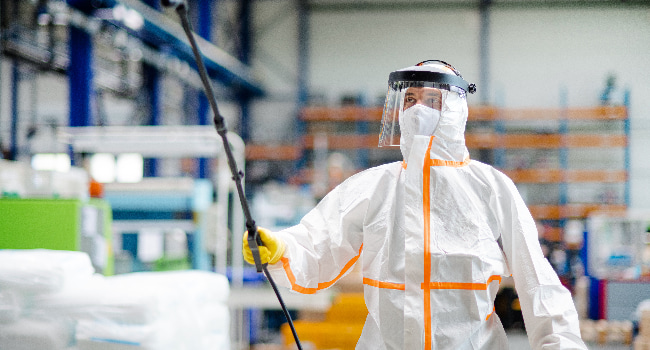
Automation and Smart Sanitation Systems
Emerging technologies in sanitation are changing how food handling and storage places keep things clean and follow rules. Automation systems can be used with warehouse management software to check on cleaning steps all the time. This helps a lot with operational efficiency. Smart sensors can watch things like temperature and humidity. The sensors help you keep the best conditions for things that can spoil. This not only makes inventory right but also helps cut down on labor costs and keep you from breaking rules. Using these advanced sanitation systems makes logistics operations run smoother. This also leads to greater customer satisfaction because you keep good hygiene standards and lower the effect on the supply chain.
Eco-Friendly and Sustainable Cleaning Solutions
Choosing eco-friendly and sustainable ways to clean helps not just with better cleaning but also with caring for the environment. When you use cleaning agents that break down easily and tools you can use again, you end up with less waste and do less harm to nature. Adding new equipment, like electrostatic sprayers, can help get the job done quicker and with fewer chemicals. Doing these things matches what many people want: more green practices. This brings about greater customer satisfaction. If food handling and storage places follow green steps, they can boost their name, meet the rules, and please the people who care about the earth. This often leads to better customer satisfaction.
Data-Driven Sanitation Monitoring
Leveraging technology for sanitation monitoring helps food handling facilities follow rules and work better. Using data analytics lets them keep track of how well things are cleaned. They can see patterns, use real-time data, and make the right decisions quickly. This be helps them use resources in the best way, keep labor costs down, and stay on top of maintenance schedules. With regular monitoring, they can fix possible sanitation problems before they get worse. This makes sure high standards stay in place.
Adding strong monitoring systems into warehouse management boosts food safety. It also plays a key part in greater customer satisfaction by keeping up product quality through the entire supply chain. This helps businesses operate with better efficiency and keeps people happy with the service.
Conclusion
To sum up, keeping strong cleaning practices in places where food is handled and stored is very important for meeting rules and keeping people safe. It does not matter if you are looking to meet guidelines or make work flow better. Having proper cleaning steps helps the whole supply chain and all supply chain operations. When you use industry expertise and try new ideas, you make your place better at keeping clean. This leads to higher customer satisfaction because people trust your food. If you decide to outsource your cleaning needs, you get smart tools and always meet the rules. So, it is a smart move for business owners who want the highest food safety standards and to boost operational efficiency.
Frequently Asked Questions
How often should food handling and storage areas be sanitized?
Food handling and storage areas need to be cleaned often. It is good to do this after each use or at least once every day. Some areas that have higher risk may need cleaning even more often. Any surface that touches food should be cleaned before you start and after you finish making food. This helps to stop germs from getting into the food.
What certifications should a sanitation service provider have?
A service provider that works in sanitation should have important certifications. These include the ISO 9001 for good quality management, OSHA for keeping people safe at work, and HACCP to show they take food safety seriously. Having these papers shows that the company follows the best rules and ways of working in the industry.
How do sanitation services help prevent pest infestations?
Sanitation services help cut down food scraps and waste. These things can bring in pests. When you clean and keep up with work often, you get rid of places where pests live. It also lowers spots where they can breed. Plus, the staff can find possible ways that pests could get inside. This way of working helps keep food handling and storage places free of pests. It is important to stay on top of cleaning for the safety and health of everyone in the facility.

Haley serves as the Marketing Manager for A1 Quality Logistical Solutions. She joined A1QLS in 2023 with her prior experience gained with GXO and XPO Logistics.
